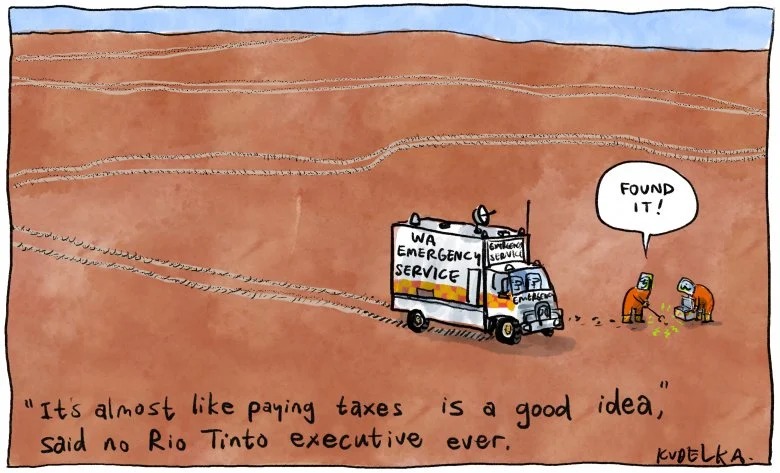‘Lost indigenous languages to be revived’ is the news from the State Library of NSW: “The Library has entered into an exciting new collaboration with Rio Tinto to help revive and preserve critically endangered Indigenous languages and word lists that are embedded in historical documents held by the Library.” It quotes the NSW Arts Minister George Souris as saying, “A nation’s oral and written language is the backbone to its culture.” So why doesn’t the NSW government fund more Indigenous language work and why is Rio Tinto the hero here? This raises an important issue for us in our efforts to raise funds for language projects. It is an age-old question: how much do we provide a smokescreen of civility for companies like Rio Tinto when we accept their funds?
Recall Andrew Forrest’s recent diatribes in which he likened royalty payments to Aboriginal people to ‘mining welfare’. It seems clear that mining companies like Forrest’s Fortescue Metals and Rio Tinto really see themselves as dispensing their own largesse and not as the beneficiaries of the mineral wealth that belongs to all of us.
Rio Tinto are desperate to improve their public image. “Despite the company’s claims, there are countless examples of alleged human and labour rights violations and environmental devastation perpetrated by Rio Tinto around the world and over decades. From Papua New Guinea to Namibia, from the Upper Peninsula of Michigan in the U.S. to Madagascar, and from Cameroon to Indonesia, Rio Tinto has a long and shameful record.” (London Mining Network). Ethical investment companies will not invest in Rio Tinto whose practices typically include dividing landowner groups and creating environmental disasters, getting away with what they can in the Third World while advertising their efforts at rehabilitation of minesites in the First World and spending a fraction of their profits (they made $7 billion in 2010) on philanthropy. Remember that they have been considered the most destructive of mining companies (as RTZ) and they have worked hard to improve their image (including changing their name from that tarnished acronym). But their practice has not necessarily improved. Rio Tinto is the company behind Freeport in West Papua, Panguna Copper (and its reopening), the molybdenum mine in British Columbia that will dump 10,000 tonnes of waste into the sea per day, the Ramu waste sea-dump, the Ranger uranium mine (and its numerous leaks and waste spills), and uranium prospects in WA (including Kintyre, where Rio Tinto is involved in dividing the local Aboriginal community) among many others. So, in fact, the result of Rio Tinto’s work is the disruption of the integrity of indigenous societies with a consequence, among many more dire, of the loss of languages, the very thing we are surely working to avoid!
So where does that leave us? If the Australian government’s mining tax were properly implemented and these companies were made to pay adequately for their extraction of our common wealth then there could be funds distributed by governments to pay for language projects. A properly funded State Library could fund its own projects and not become complicit in providing respectability to the likes of Rio Tinto. Instead we go with begging bowls to the corporations whose scattered (tax-deductible) crumbs we gratefully sweep from the floor.

 Follow
Follow
The relevant paragraphs of the 2010/11 Annual Report of the SLNSW Foundation have a little more information on the SLNSW project.
Norwegians are putting a lot of resources into an endangered language, Sami, (and their efforts are interesting). I can’t see that the NSW government is putting much into endangered languages. Norwegians have very high resources taxes – nearly double what was proposed for Oz. I wonder whether this reflects a difference between a country whose inhabitants were poor and constrained by lack of arable land and resources until they found oil, and a country of immigrants who found everything for the taking when they arrived, and who can’t get used to planning for a future with less.
Great post, I’ll recommend to my students. RTA throw lots of crumbs to the heritage sector more broadly in Australia and it’s openly accepted without critique or hesitation.
More on the problems with Rio Tinto and the reasons that the Norwegian Pension Fund came to blacklist them are here http://english.aljazeera.net/indepth/opinion/2011/08/2011823133628702154.html
And, as if we needed more about RTZ/Rio Tinto’s lack of respect for Indigenous people, the most recent report of it walking away from the environmental disaster it caused at Panguna (not to mention the civil war that went on around the mine and revenue from it) http://www.theage.com.au/world/billiondollar-mess-a-major-disaster-the-people-do-not-deserve-to-have-20160817-gquzli.html
“We believe that [the company] was fully compliant will all regulatory requirements and applicable standards at the time,” Rio Tinto executive Joanne Farrell wrote to Dr Momis (president of Bougainville’s autonomous government) on August 6.
Rio Tinto has shown its normal operating procedures again in the destruction of the Juukan cave, and now Marcia Langton (onetime Rio Tinto supporter, see https://minerals.org.au/sites/default/files/MCA%20Monograph%207%20-%20From%20Conflic~on%20by%20Professor%20Marcia%20Langton.pdf) has an opinion piece demanding a proper inquiry and a change in Rio’s procedures (https://www.theguardian.com/commentisfree/2020/jul/28/we-need-a-thorough-investigation-into-the-destruction-of-the-juukan-gorge-caves-a-mere-apology-will-not-cut-it)